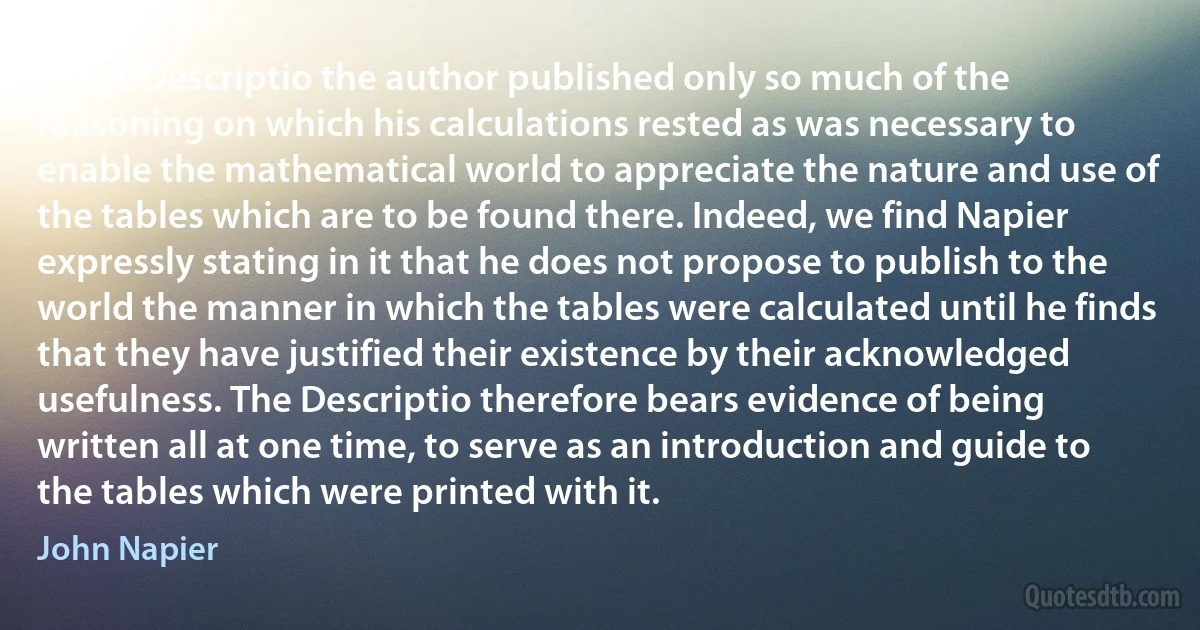
In the Descriptio the author published only so much of the reasoning on which his calculations rested as was necessary to enable the mathematical world to appreciate the nature and use of the tables which are to be found there. Indeed, we find Napier expressly stating in it that he does not propose to publish to the world the manner in which the tables were calculated until he finds that they have justified their existence by their acknowledged usefulness. The Descriptio therefore bears evidence of being written all at one time, to serve as an introduction and guide to the tables which were printed with it.
John NapierRelated topics
found find guide nature necessary propose serve stating time use world write NapierRelated quotes
Each of the parts of philosophy is a philosophical whole, a circle rounded and complete in itself. In each of these parts, however, the philosophical Idea is found in a particular specificality or medium. The single circle, because it is a real totality, bursts through the limits imposed by its special medium, and gives rise to a wider circle. The whole of philosophy in this way resembles a circle of circles. The Idea appears in each single circle, but, at the same time, the whole Idea is constituted by the system of these peculiar phases, and each is a necessary member of the organisation.

Georg Wilhelm Friedrich Hegel
Reading is merely a surrogate for thinking for yourself; it means letting someone else direct your thoughts. Many books, moreover, serve merely to show how many ways there are of being wrong, and how far astray you yourself would go if you followed their guidance. You should read only when your own thoughts dry up, which will of course happen frequently enough even to the best heads; but to banish your own thoughts so as to take up a book is a sin against the holy ghost; it is like deserting untrammeled nature to look at a herbarium or engravings of landscapes.

Arthur Schopenhauer
Chess is a form of intellectual productiveness, therein lies, its peculiar charm. Intellectual productiveness is one of the greatest joys -if not the greatest one- of human existence. It is not everyone who can write a play, or build a bridge, or even make a good joke. But in chess everyone can, everyone must, be intellectually productive and so can share in this select delight. I have always a slight feeling of pity for the man who has no knowledge of chess, just as I would pity for the man who has no knowledge of love. Chess, like love, like music, has the power to make men happy.

Siegbert Tarrasch
Broader and deeper we must write our annals, from an ethical reformation, from an influx of the ever new, ever sanative conscience, if we would trulier express our central and wide-related nature, instead of this old chronology of selfishness and pride to which we have too long lent our eyes. Already that day exists for us, shines in on us at unawares, but the path of science and of letters is not the way into nature. The idiot, the Indian, the child, and unschooled farmer's boy, stand nearer to the light by which nature is to be read, than the dissector or the antiquary.

Ralph Waldo Emerson
And last of all we have the secondary forms of crystals bursting in upon us, and sparkling in the rigidity of mathematical necessity and telling us, neither of harmony of design, usefulness or moral significance, - nothing but spherical trigonometry and Napier's analogies. It is because we have blindly excluded the lessons of these angular bodies from the domain of human knowledge that we are still in doubt about the great doctrine that the only laws of matter are those which our minds must fabricate, and the only laws of mind are fabricated for it by matter.

James Clerk Maxwell
